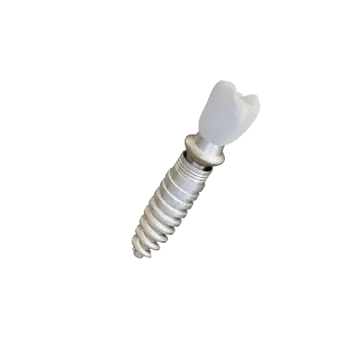Implants

Restore Smile And Preserve Jawbone With Dental Implants
Dawson Modern Dentistry - Matthews feels compassionate with those patients who are dealing with missing teeth due to various reasons. Whether you have lost only one tooth or more than that, our dental implants can give you a complete smile. Customized to fit within your mouth and blend with surrounding teeth, our dental prosthetics can boost your self-esteem. Call (704) 703-3336 and know if you are eligible to get dental implants in Mathews, NC.
What Is A Dental Implant?
A dental implant is a prosthetic tooth that will replace your missing tooth. Dental implants are usually made of titanium, which is a bio-compatible metal. The implant is surgically placed into the jawbone, where it will fuse with the bone. This process, called osseointegration, takes several months. The implant will eventually support a crown, bridge, or denture.
What Are The Steps Involved In Dental Implant Placement?
DAMAGED TOOTH REMOVAL
First, your dentist will numb the treatment area to prevent discomfort. Then, he or she will carefully remove any damaged tooth enamel, leaving a strong base for a dental implant.
JAWBONE PREPARATION (GRAFTING)
For patients who do not have enough jawbone density, your dentist will perform a bone grafting procedure where bone from either another part of your body or a bone substitute is grafted to the jawbone area to support new bone growth.
DENTAL IMPLANT PLACEMENT
The implant will be placed into the jawbone by a surgical procedure to replace the lost tooth roots. A healing cap will be attached to the top of the dental implant. This cap will heal the gums and prevent infection during the healing process.
BONE GROWTH AND HEALING
After a dental implant is placed, the surrounding bone and gum tissue need time to heal. Also, the implant will need to fuse with the jawbone. This process is called osseointegration and typically takes 3-6 months.
ABUTMENT PLACEMENT
After your jaw has healed, your dentist will place an abutment over each dental implant. Abutments are the small metal posts that anchor your replacement teeth to your implants. Your dentist will secure each abutment with dental cement, so it does not shift.
ARTIFICIAL TOOTH PLACEMENT
A dental implant crown, also known as a restoration, is an artificial tooth that replaces the crown of a missing tooth. The crown is custom-made to look and function just like a natural tooth, and it’s attached to the dental implant to complete the restoration.
What Are The Advantages Of Dental Implants?
Look and feel like natural teeth
Dental implants are the closest thing to natural teeth and can last a lifetime when properly placed and cared for. Implants function as your own teeth, allowing you to eat all of your favorite foods without worry. They look just like natural teeth and don’t feel like you have an artificial tooth in your mouth.
Have Questions About Dental Implants? Find Answers Here.
Do you have a question? Or do you wish to schedule an appointment with us? Call Dawson Modern Dentistry at (704) 565-9512 or visit Dentist in Matthews NC at 3555-2 Matthews-Mint Hill Rd, Matthews, NC 28105.

